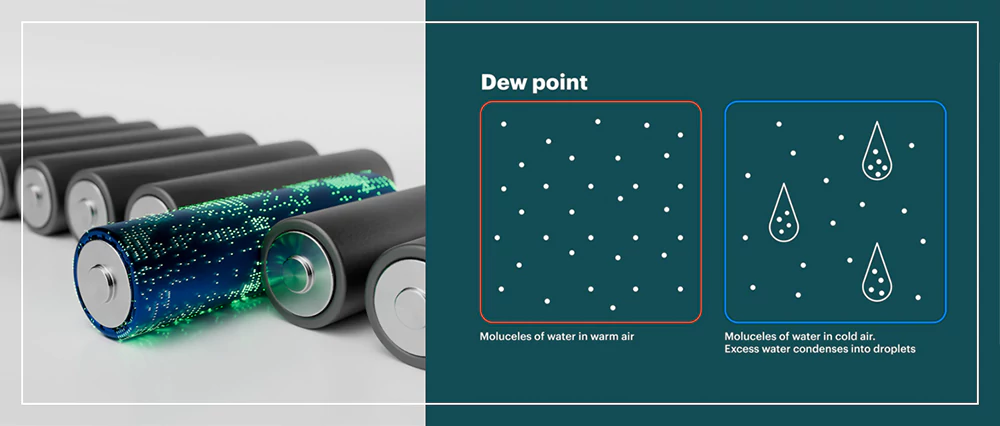The dew point is the temperature at which moisture condenses. When the water vapor content in the air remains unchanged and the air pressure is kept constant, the temperature at which the air is cooled to saturation is called the dew point temperature (Td), or dew point for short. It can also be understood as the temperature at which water vapor and water reach equilibrium. The difference between the actual temperature (t) and the dew point temperature (Td) indicates how close the air is to saturation. When t>Td, the air is unsaturated, when t=Td, it is saturated, and when t<td, it is oversaturated.
|
Relative size |
Water vapor content in the air |
|
Ambient temperature > dew point temperature |
Unsaturated |
|
Ambient temperature = dew point temperature |
Saturated |
|
Ambient temperature < dew point temperature |
Oversaturated |
Lithium-ion batteries have very strict requirements on environmental humidity during the manufacturing process, mainly because the loss of moisture control or coarsening control will have serious adverse effects on the electrolyte. The electrolyte is the carrier of ion transmission in lithium-ion batteries. It is composed of lithium salts and organic solvents. It is the guarantee for lithium-ion batteries to obtain advantages such as high voltage and high specific energy.

Excessive moisture will have serious adverse effects on the electrolyte:
1. Electrolyte deterioration
The electrolyte is the carrier of ion transmission in the battery, composed of lithium salt and organic solvent. The electrolyte plays the role of conducting ions between the positive and negative electrodes of the lithium battery, and is the guarantee for the lithium-ion battery to obtain advantages such as high voltage and high specific energy. During the battery filling process, the humidity must be less than 1%, and the battery must be sealed as soon as possible after filling to prevent the inside of the battery from contacting the air. If the moisture is too high, the electrolyte reacts with the moisture to generate trace amounts of harmful gases, which have an adverse effect on the environment of the filling room; this will also affect the quality of the electrolyte itself, resulting in poor battery performance.
2. Battery capacity decreases
The first discharge capacity of the battery decreases as the water content in the battery increases. Excessive water content will damage the effective components of the electrolyte and consume lithium ions, causing irreversible chemical reactions of lithium ions in the negative electrode of the battery. As lithium ions are consumed, the capacity of the battery decreases.
3. Increased internal resistance
As the water content of the battery increases, the internal resistance tends to rise. During the use of the battery, the internal resistance is small, so that large current discharge can be carried out and the battery power is high. If the internal resistance is large, large current discharge cannot be carried out, and the battery power is relatively low. Excessive water content will affect the quality of the SEI film in the lithium battery, thereby affecting the internal resistance of the battery.
4. Excessive pressure inside the battery
Water reacts with LiPF6 in the electrolyte to generate harmful gases. When there is too much water, the pressure inside the battery increases, causing the battery to deform under stress. If it is a mobile phone battery, it will appear as a bulging shell. When the internal pressure is higher, the battery is in danger of exploding, and the explosion will cause the electrolyte to splash, and the battery fragments may easily injure people.
5. Battery leakage
In addition to generating gas, the LiPF6 in the electrolyte reacts with water to produce hydrofluoric acid, a highly corrosive acid that can corrode metal parts inside the battery, causing the battery to eventually leak. If the battery leaks, the battery performance will drop rapidly, and the electrolyte will also corrode the user's machine.
Summarize:
The electrolyte, positive electrode material and negative electrode material are very sensitive to water. To ensure the quality of the battery, the moisture in the workshop and glove box must be strictly controlled. In particular, some key processes, such as battery cell drying, electrolyte filling, sealing, etc., must be carried out in a low humidity environment of less than 1% to prevent moisture from entering the electrolyte. At this time, the change in dew point temperature value is needed to reflect the fluctuation of humidity. Generally, the dew point temperature should be controlled below -45℃, or even drier.
TOB NEW ENERGY provides a full range of lithium-ion batteries, sodium-ion batteries, supercapacitors, solid-state batteries, and lithium-sulfur battery solutions.